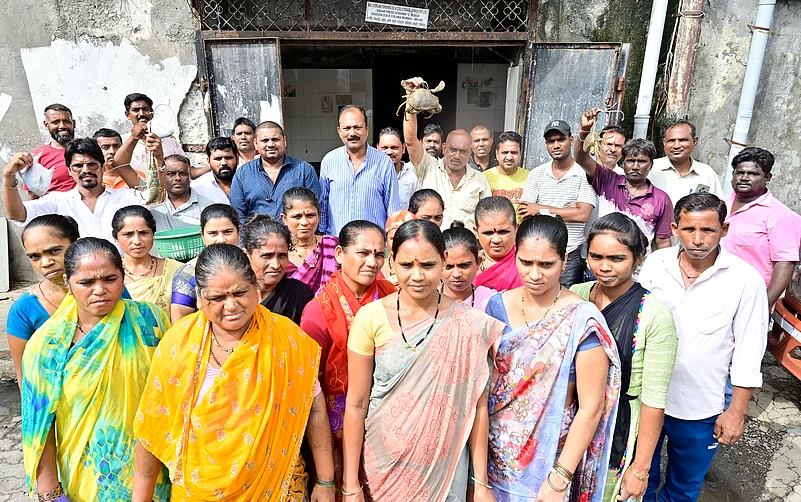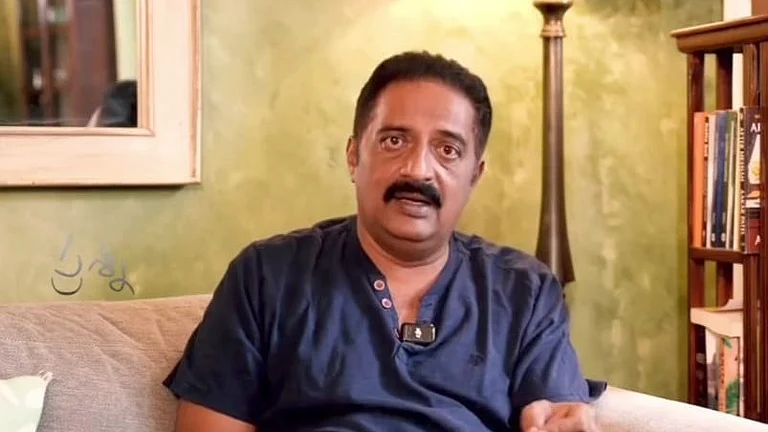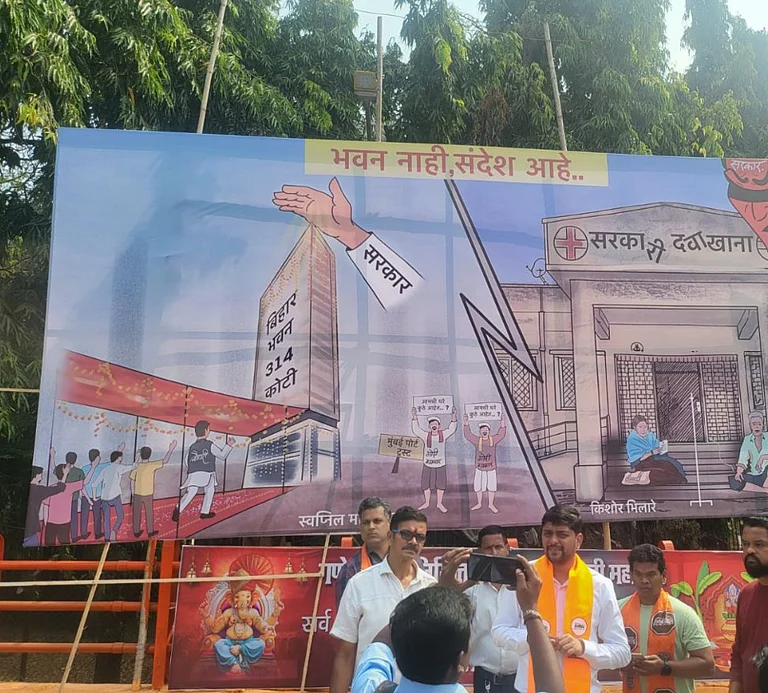
Summary of this article
Mumbai Port Authority announced the auction of 18 sealed godowns at the Sassoon dock, impacting hundreds of traders and workers.
Maharashtra Fisheries Dept stands accused of siphoning funds and subletting units to locals without due payment to the Port Authority.
The Port Authority plans to build a modern, AC market to replace the current bustling markets of the local fishing community.
The ink was barely dry on seals slapped on 18 godowns at Sassoon Dock, when the Mumbai Port Authority (MbPA) announced plans to auction the premises through a ‘transparent tendering process’.
The move has panicked the local fishing community, who believe their 150-year-old lifeline is being auctioned away for profit.
In a desperate bid to halt the impending auction of evicted godowns and reclaim their stolen futures, over 20,000 fisherfolk from Sassoon Dock are set to launch a hunger strike.
On November 13, MbPA issued an eviction notice, which displaced hundreds, and five days later, the auction plan was made public on November 18.
Among those displaced is veteran sub-tenant Janabai Vadhavane from Godown No. 1773, who had paid rents faithfully to the Maharashtra Fisheries Development Corporation (MFDC) for a decade despite a 2014 Supreme Court eviction order.
Sassoon Dock, Mumbai's bustling epicenter for the seafood trade, processing 150 tons of daily catch worth ₹4 crore, now teeters on the brink of transformation.
MbPA officials – who took possession of these sealed godowns amid scuffles with protesting fisherfolk – stated the godowns will be cleaned and reallocated at a threshold price of ₹55 per sq ft under ready-reckoner rates, with leases for five to ten years aimed at fish trading continuity. However, the fishing unions decry it as a “blatant scam,” pointing to MFDC's unauthorized subletting post-2014 SC directive, which allowed entities like Vadhavane's unit to exist, and amass ₹115-120 crore in unpaid dues over two decades.
Krishna Pawle, President of the Sassoon Dock Fish Traders Association and Shiv Bharatiya Port Sena, who is spearheading the resistance, lambasted the double standards. “The MbPA labels our hardworking sons of the soil as ‘illegal’ and throws them onto the streets with help of the police force under the Public Premises Act. Meanwhile, BMC never calls their hawkers ‘illegal’, many not even original Mumbaikars, despite endless citizen complaints. They protect them fully. Why? Taxpayers like us contribute directly to the government, making us easy targets. But those deemed illegal by citizens flourish because officials pocket benefits,” Pawle declared, his words fueling a swelling protest movement. Vadhavane echoed the betrayal: “MFDC allotted us the space in 2015, took our rents till 2025, but vanished when MbPA struck. We've been misled and exploited.”
Irfan Khan, who owns two warehouses, said, “You see, they are not playing with land here but with lives. They are taking away our livelihoods. The fishing industry will suffer a massive jolt. Fishing is still happening, but where is the storage? My fish goes to hotels and is exported to the Middle East. We also need to understand that our competition is with Pakistan, which has a large coastline. What are we supposed to do now?”
The dispute over these units is not new. It can be traced back to the 1999 rent hikes, but intensified in 2014 when the SC ordered MFDC to vacate within six months over violations like subletting and constructions. A 2015 tripartite agreement under Union Minister Nitin Gadkari promised exemptions and development, but the promise was never realised. More promises followed. Fisheries Minister Nitesh Rane ran a no-eviction pledge in July and more recently, ₹96 crore plan to Union Minister Sarbananda Sonowal's 30-day resolution call evaporated as seals went up, affecting 50 labourers per godown. These numbers also include many Koli women who are Mumbai's indigenous fisherfolk.
At the heart of the crisis lies the accusation that the Maharashtra Fisheries Development Corporation's (MFDC), on account of its opaque financial practices, has allegedly siphoned rents from vulnerable fisherfolk while leaving the Mumbai Port Authority (MbPA) high and dry.
For over two decades, MFDC leased approximately 60 godowns at Sassoon Dock from MbPA at nominal rates starting as low as ₹4 per square foot but then sublet them to traders and processors at inflated charges, with no remittances given to the port authority. Traders like Janabai Vadhavane faithfully paid their dues to MFDC annually from 2015 onward, armed with receipts that now feel like worthless scraps of paper, only to discover that MFDC pocketed these funds amid escalating Ready Reckoner rates that ballooned demands to ₹100-150 per square foot.
Krishna Pawle, President of the Sassoon Dock Fish Traders Association and Shiv Bharatiya Port Sena, who has been at the forefront of the resistance, condemned the double standards starkly. “The MbPA calls us, the sons of this soil, ‘illegal’ and throws us out with police under the Public Premises Act. But the BMC never labels their hawkers illegal and protects them fully, even when most aren’t original Mumbaikars. Taxpayers like us are the easiest to target, while those considered illegal by citizens flourish because some officials profit from them.”
Tensions peaked on November 17 when evicted traders clashed with MbPA contractors for allegedly using minors for cleaning, leading to a complaint filed with the Colaba police.
With tenders slated within six months, whispers of gentrification loom large. Promised visions of air-conditioned markets, museums, and restaurants could sideline the raw, vital trade that sustains 25,000 workers. Pawle raises a battle cry despite the daydreams being peddled by the authorities, “It's time, dear tax-paying citizens, to wake up, step out, and end this ‘Hitlership’ once and for all.”
As 20,000 fisherfolk gear up for mass rallies, the auction threat underscores a battle for heritage versus revenue. Unless intervention revives the 2015 pact, Sassoon's morning symphony of auctions and haggling risks auctioning off Mumbai's soul.

























